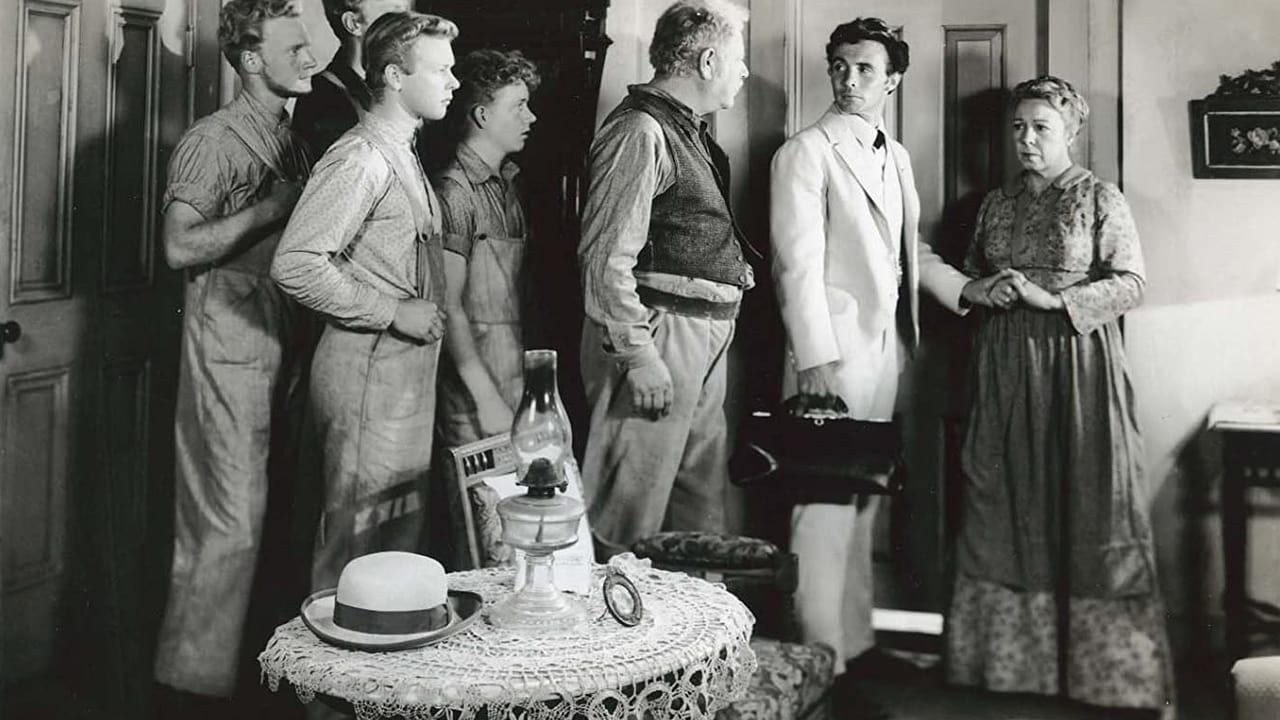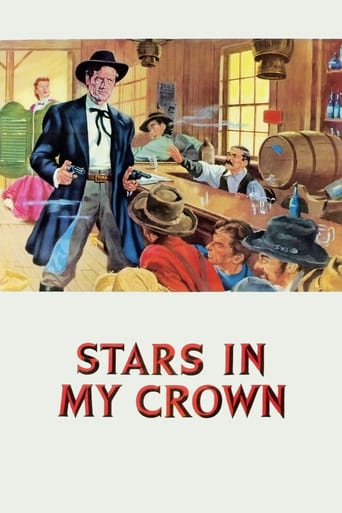Claysaba
Excellent, Without a doubt!!
Fairaher
The film makes a home in your brain and the only cure is to see it again.
Sameer Callahan
It really made me laugh, but for some moments I was tearing up because I could relate so much.
Roy Hart
If you're interested in the topic at hand, you should just watch it and judge yourself because the reviews have gone very biased by people that didn't even watch it and just hate (or love) the creator. I liked it, it was well written, narrated, and directed and it was about a topic that interests me.
atlasmb
Featuring strong performances, "Stars in My Crown" could have been an inspiration for "To Kill a Mockingbird". It has a narrator, a strong-willed central character who is a man of local authority, and a scene of mortal confrontation. But it lacks the focus and the depth of the "Mockingbird" story.Also, its central theme is not about the goodness of men, because its story implies that all goodness comes through faith, undercutting the hopefully humanist message that makes "Mockingbird" such a wonderful story.Still, "Stars" is an engaging film. It evokes the atmosphere of a small town. And the incidental music is strong. Joel McCrea plays a no-nonsense parson who is seen as the town's conscience. He is both pragmatic and a man of principles. A young Dean Stockwell plays the parson's boy with a convincing yet childish intensity.
JeffersonCody
STARS IN MY CROWN (1950): with Joel McCrea, Ellen Drew, Dean Stockwell, Alan Hale, Lewis Stone, James Mitchell, Amanda Blake, Juano Hernandez, Ed Begley, Arthur Hunnicutt and James Arness, directed by Jacques Tourneur. Rating: **** stars. VERY HIGHLY RECOMMENDED.One of the most beautiful and touching films I have seen in the last year or so. If "Stars in my Crown" doesn't move you, you have a heart of stone. Joel McCrea - radiating sincerity, integrity and goodness, plays Pastor Josiah Grey, a Protestant minister who was a soldier in the Civil war. He arrives in the small town of Walesville, strides into the bar, puts his six guns guns on the counter and preaches a sermon. And of course he never puts those guns on again. Josiah builds a church, marries Harriet (Ellen Drew) and adopts his nephew John (Dean Stockwell). Trouble rears its head when Lon Bracket (Ed Begley) tries to buy the former slave, Uncle Famous Prill's (Juano Hernandez) land because he wants to mine it. Uncle Famous refuses to sell and an angry Lon sends a bunch of bullies to destroy the place. But the Swedish farmer Jed Isbell (Alan Hale) - a friend of Josiah's who doesn't attend church, and his six boys turn up to fix the farm.Later, a typhoid epidemic strikes the town and young doctor Dr. Harris (James Mitchell) attends to the sick and dying while Josiah attends to their souls. This annoys the doctor, who persuades Josiah that he is responsible for spreading the disease. He's wrong, but Josiah, feeling guilty, closes his church and starts staying indoors. Meanwhile, Lon gathers the Klu Klux Klan and prepares to lynch Uncle Famous. Jed and his sons are ready to shoot it out with the Klan, but Josiah has another plan. At times, this lovely, heartwarming film reminded me of "To Kill a Mockingbird" and I was surprised, considering when it was made, at how strongly it stands against racism and supports Civil Rights. I also enjoyed the fact that Josiah Grey never talks about the supernatural. If only there were more preachers like him in the world. He is a good man through and through. Jacques Tourneur is a terrific director and I have enjoyed many of his films, but this is the best one I have seen yet. Now wonder he wanted to make it so badly that he was prepared to accept a minimal salary. It's a gentle, yet powerful classic. The final stand off between Josiah Grey and the Klan, BTW, is unforgettable.
Robert J. Maxwell
Narrated by a now grown-up Dean Stockwell, this is the story of an ex-Confederate soldier, Joel McRea, who comes to the town of Whalesville, hangs up his guns, and becomes the town preacher.There are multiple narrative threads. The town's old doctor dies and his stern, somewhat atheistic son takes over. A little friction there. Then there's the typhoid epidemic which lays much of the town low. One glimpse of chubby, perky little Dean Stockwell and you know he's going to be one of the patients. Then there's the conflict between old Famous, played by Juano Hernandez, Hollywood's Negro, and blowhard, greedy Ed Begley who wants Hernandez's land because Begley's mica vein runs through it. This leads to the final confrontation in which the Ku Kux Klan comes to lynch old Famous and take his land. They're talked down by the patient, honest, true-blue Joel McRea. Everybody winds up singing the hymn, "Stars in My Crown," in church and they all live happily ever after. Well, Ol' Famous isn't seen singing in the white church. We don't want the fantasy to turn clotted.There are a couple of notably above average elements in the film. One is Jacques Tourneur's direction. It can't be reproached. Like his mentor, Val Lewton, he's seen to period detail. Watch the fly scarers swirl over the freshly baked chocolate cake. Watch the mechanical apple peeler at work. He overplays nothing, nor do the actors. (Interesting to see James Arness and Amanda Blake working together before "Gunsmoke.") The director and the performers don't overplay anything, and they deserve thanks, because the script overplays everything for them.It's really a rural wonderland we see, and a slightly anti-modernistic one, a little sour beneath all the treacle. Any movie in which a disabled ex-Confederate soldier and his half-dozen sons break out their guns and ride to save an old Darkie from losing his pitiful plot of farm land represents something other than a naturalistic view of humanity.The town's new doctor is described by his dying father, the town's old doctor, as "long on learning and short on experience." (Something like that.) The experience he must learn is to give up his claim to Aesculapian authority and become just one of the folks, not hoisty-toity, not an elitist, singing in church, smiling happily, settling in.This is John Ford territory but I doubt that Ford would have been so committedly earnest. The narration wouldn't have to spell out for us how essential it is that we all hang together, that we don't feel innately superior to anyone else, that we treat each other fairly, that we think of the community before we think of ourselves. Ford would have shown it. There would be dances, humor, drinking, a comic fist fight, a miscreant boy being spanked lovingly.If you liked the TV series, "The Waltons," you'll probably kvell over this one. If you liked "To Kill a Mockingbird," you'll like this too, although "Mockingbird" is in many ways a more demanding tale.I was trying to think about audience responses to this. It was released in 1950. There were people in the rural audiences for whom this represented a kind of glowing memory, blended with a certain dreaminess; there were people who could easily recall their youth from forty years earlier, in 1910, when many of the characteristics of small-town Southern life would have been living reminiscences. The horses, the drinking out of wells, everybody deferring to the Parson, the reassuring doc making house calls with his black bag, the town meanies who are good at heart. That traditional life style was no farther back in time for them than Vietnam is for us.The movie is like one of those Twilight Zone episodes in which a harassed modern man is transported back to his innocent, happy childhood. It's satisfying in its own way.
opusv5
Enjoyed this film. It portrayed a post-Civil War mid-west (so it appeared)community in a way that could make you nostalgic. Not that everything was perfect: the Ku Klux Klan harassing a freed black man (the distinguished Puerto Rican actor Juano Hernandez)primarily because they want his land. That preacher Joel McCrae manages to talk them out of it by appealing to their basic decency works without being cloying. Initially a muscular Christian, he here uses his brain to do the Lord's work. Also believable was the community's vulnerability to disease. They had no laboratory-testing facilities to see if that well-water was the source. McCrae's self doubt in the face of all this is believable.As for the cast, I'm pretty sure I spotted an uncredited Peter Graves as one of Alan Hale's offspring.

